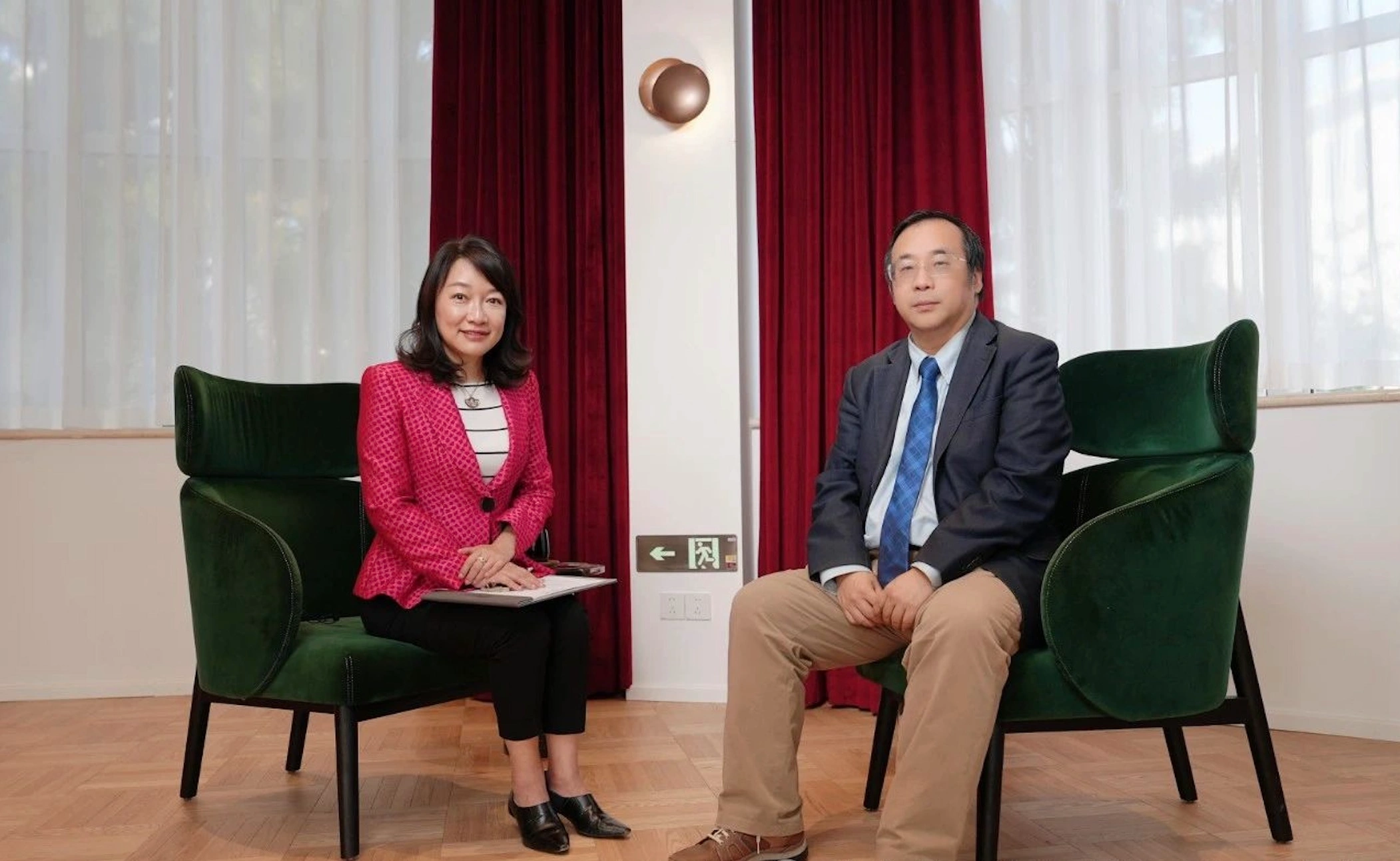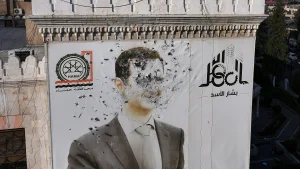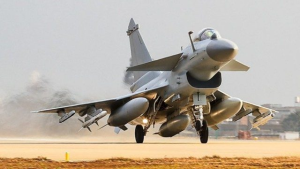The Global Impact of the Palestinian-Israeli Conflict Is Limited
Wu Bingbing, Director of the Center for Middle East Studies at Peking University, sat down with Beijing Club for International Dialogue and shared his observations on the latest changes in the Middle East, the Gaza crisis in particular.
 Han Hua (left) and Wu Bingbing (right)
Han Hua (left) and Wu Bingbing (right)
HAN Hua: You have just returned from the Middle East, how do you evaluate the current situation in the Middle East on the whole? Is there a possibility of further escalation in the Palestinian-Israeli conflict? Can China play a more important role in the current situation?
WU Bingbing: The effect on the broader Middle East is actually limited in scope, it covers the Gaza Strip, Palestine, Lebanon, but not the entire Middle East region; so we see that the UAE, Saudi Arabia, including Egypt, these countries are still normal. In the early morning hours of October 26th, Israel struck Iran, around the same time my flight took off from the UAE, which was not affected in any way, the entire airport operated normally. This shows that although the local conflicts are very intense, the scale and scope of the conflicts are still limited in the broader Middle East. Many Chinese scholars say that the current situation in the Middle East is like a “storm in a teacup”, and that conflict in the warzone is very intense, the overall situation in the Middle East has not plunged the whole region into turmoil. This is very important. We can travel freely to many countries, including the Gulf States and North African countries, even Iran. With regard to the conflict in Gaza, from the Israeli point of view, although they have set high military goals, such as the elimination of Hamas, the rescue of all hostages and the neutralization of the threat to themselves, in practice the goals have begun to be more focused. Now, Israel is focusing mainly on two corridors, one is the Philadelphia Corridor, which is the area separating the Gaza Strip from Egypt; it used to be under the joint control of Egypt and the Palestinians, which Israel intends to regain control of because of its fear of the flow of supplies into Gaza through the Sinai Peninsula.
The other is the Nazarim Corridor, which divides Gaza into northern and southern sections, in order to respond to emergencies in a timely manner. Israel’s military focus has shifted to control of the two corridors rather than full control of Gaza.For Israel, it has entered a state of relatively low-intensity but sustained combat. Israel’s center of focus has shifted to Lebanon since September, and despite air strikes and targeted killing operations, progress on the ground has been relatively slow. From the Lebanese perspective, Israel’s goal is not to eliminate Hezbollah, but to ensure the safety of the population of northern Israel; threat of Hezbollah rockets has made it impossible for some 120,000 residents of northern Israel to live at home, leading to a massive population displacement. Therefore, the goal set by Israel in Lebanon was to protect security at home, not to achieve a complete military victory in Lebanon. Although Israel’s actions have escalated, they are constrained by a number of external factors, such as France’s and the United States’ concern over the situation in Lebanon; neither of them want the conflict to expand to the whole of Lebanon. While there is a tendency to escalate, its intensity and strength is limited because if the conflict were to spread, it would involve a wider range of issues, including those related to Syria and Iran.A long-term solution to the current Palestinian-Israeli conflict cannot be achieved by military means. All military actions ultimately require a political solution, and military means by themselves cannot deliver a permanent solution to the problem.
China advocates for a political solution, and since we want a political solution, we have to sit down and talk. We saw this work with the rapprochement between Saudi Arabia and Iran last year; China’s role as mediator in Middle East diplomacy is becoming more and more obvious.In our view, China’s position is clear: to reach a political settlement through mediation and to promote peace and stability in the Middle East. Conflicts in the Middle East are not limited to the Gaza Strip; there are also conflicts and challenges in Sudan, Yemen and other places. If these conflicts are not de-escalated and a political solution found, peace and stability will still be threatened. Therefore, China’s efforts in the Middle East were not just in response to the current Palestinian-Israeli conflict, but for the long-term stability of the entire region.From my visits in the Middle East, many locals are looking forward to China’s role. Last year’s rapprochement between Saudi Arabia and Iran not only eased tensions between them, but also reduced the number of active conflict throughout the region, giving locals hope that conflicts can be de-escalated. Without this rapprochement, people may have lower expectations for peace and less confidence in the future. China’s role is very important, especially in the current situation in the Middle East.
HAN Hua: What do you think will be the next opportunity for a political solution to the Palestinian-Israeli conflict?
WU Bingbing: I think the challenge now is that Israel has its domestic political agenda. Because even before October 7th of last year, the domestic political conflicts in Israel were already very acute, millions of people were marching every weekend to express their dissatisfaction with the Netanyahu government’s judicial reform measures. So from this perspective, the pressure of Israel’s domestic politics influences their policy choices in the region. In fact, while the conflict is going on, many domestic problems are temporarily downplayed. If the conflict subsides, the problems of domestic politics may bubble up again. Therefore, it is important to look not only at the United States and regional factors, but also to take note of the domestic factors in Israel. These factors have a great impact on the situation, and we haven’t reached the point in time for a resolution. The Israeli government has relieved domestic pressure through war, so for now it looks like the government still has a need (for war).
HAN Hua: What about the U.S. attitude toward this? Is Israel’s weapons orders a stimulant for the U.S. military-industrial complex? Do they maybe not want to push for a political settlement that quickly, is that a consideration?
WU Bingbing: U.S. aid to Israel is actually accomplished by allowing Israel to buy U.S. arms, but using U.S. military aid funds. This is one part. The other part is that the U.S. has front-loaded weapons stockpiles in Israel that Israel can use directly, or even mobilize weapons stockpiles in other areas. Therefore, Israel is consuming these supplies. And for the U.S., this becomes a domestic military program, which can increase output.
HAN Hua: That stimulates the U.S. military-industrial complex, right?
WU Bingbing: Yes. For the United States, it goes beyond that; they also benefit from the demand for its weapons from other Arab countries. Through foreign money buying U.S. arms, the U.S. domestic military industry is kept alive.
HAN Hua: Then among the Arab countries, Saudi Arabia, for example, who has been very low-key at this BRICS summit, that’s not quite consistent with their application to join BRICS. Is this related to Saudi Arabia’s need for U.S. weapons?
WU Bingbing: The situation in the Middle East is very complicated, and Saudi Arabia’s performance in Yemen shows the relative weakness of its national defense capabilities and its inability to maintain national security. They have to consider how to maintain their security in the face of Israel and Iran. And this is not just a question of how many arms to buy, but also the need to develop their own independent security capabilities. As of now, Saudi Arabia still needs external security support, and the country that can provide such comprehensive support is still the United States.The relationship between Saudi Arabia and the United States goes back a long way, so they have high expectations of the United States. Last year we saw that there have been discussions between Saudi Arabia and the United States about signing a defense agreement, and even a desire to elevate the relationship from a partnership to an alliance similar to that between South Korea and Japan. The Saudis want the U.S. to provide them with fuller security guarantees, even protection.
HAN Hua: The issue of national security is indeed critical. You mentioned the situation in the Middle East, where conflicts are more intense locally but relatively stable on a regional level. Does this reflect a tacit understanding?
WU Bingbing: With regard to the overall situation in the Middle East, we can see that Arab governments have taken a stand on the sidelines with regard to the conflict between Israel and Gaza, the conflict between Israel and Lebanon, and the conflict between Iran and Israel. Although they issued condemnations, such as on the Israeli strike on Iran, which was condemned by Saudi Arabia and the UAE, no real action has been taken. There is a consensus between the Gulf states and Iran that Israel should not be allowed to use their airspace for strikes, but this does not mean that they have chosen to take a stand in the conflict. The Gulf States and most of the Arab States governments have maintained an attitude of neutrality and happy to look on from the sidelines, an attitude that has determined that they are not deeply involved in the conflict.
HAN Hua: So the overall situation remains stable despite the intense localized conflicts?
WU Bingbing: Yes, from what we can see, these countries are still moving forward with their normal affairs in their own ways, and have not completely changed their diplomatic or security strategies because of the localized conflicts. This is also why the situation in the Middle East can maintain a “delicate balance” outside localized conflicts.
HAN Hua: What kind of strategy has Iran adopted in the current Palestinian-Israeli conflict? And what is its influence in the Middle East?
WU Bingbing: From Iran’s point of view, the relationship between it and Israel is one of long-term attributional confrontation, because it is not possible for Iran to annihilate Israel, and likewise it is not possible for Israel to annihilate Iran. Therefore, Iran’s attitude is clear, it is not trying to launch attacks on Israel without consideration for cost, but adopting a strategy of long-term resistance. As the head of its axis of resistance, Iran cooperates with non-state actors on the periphery, such as Hezbollah and Hamas, which are directly involved in the conflict, and Iraq and the Houthis, which raid or attack Israel through their respective means. However, Iran itself avoids large-scale direct military confrontation with Israel. Iran’s strategy has been to provide equipment and advisory support rather than to engage directly in the war.
Over the past decade or so, despite its military presence in Syria, Iran has exercised restraint and has not directly engaged in a full-scale war. Even when Israel attacked the Iranian consulate in Damascus on April 1, Iran responded with restraint, avoiding leading to further exacerbation and escalation of the situation. Overall, Iran’s strategy is to maintain a low-cost mode of attrition to avoid high war expenses. In contrast to Israel’s technological and intelligence superiority, Iran pushes up the cost of Israel’s defenses by engaging in attrition through low-cost drones and missile weapons. Thus, from Iran’s perspective, it wants to maintain this long-term stalemate without dragging the entire region into a large-scale conflict.
HAN Hua: Given this low-cost strategy of attrition, what do you think is Iran’s national strategy?
WU Bingbing: Iran’s strategy is mainly based on “resistance”, which is Iran’s brand in the region, representing its opposition to the hegemony of the United States and its opposition to the Israeli occupation of Palestine. These two objectives are very clear. At the same time, Iran has a clear strategy in its neighborhood and in the Global South, which consists mainly of maintaining good-neighborly relations with neighboring countries and cooperation in the Global South, such as attention towards Central Asian countries, easing tensions with the Gulf countries, and attention towards China and Russia. Iran’s rising partnerships in BRICS, SCO, Africa and Latin America are strategic objectives that complement each other to form an overall national strategy.
HAN Hua: These are all strategies that act in parallel, right?
WU BINGBING: That’s right. Iran insists on resistance on the one hand and seeks development on the other. Resistance does not mean pure conflict, it is also a strategy. For example, on the nuclear issue and sanctions, Iran will communicate and coordinate with the West as necessary. This highly flexible strategy helps Iran expand its influence in the region.
HAN Hua: Now Saudi Arabia and Iran are planning to hold joint military exercises in the Red Sea waters, Egypt has also expressed interest in joining. Can you confirm this news? How will the U.S. and the West respond to this?
WU BINGBING: According to current reports, AFP mentioned that Saudi Arabia and Iran actually conducted joint exercises in the Gulf of Oman, not the Red Sea. The Red Sea is relatively more sensitive because of the presence of the Houthis. The exercises in the Gulf of Oman are more focused on the security of access to the Persian Gulf and the Strait of Hormuz. For Saudi Arabia and Iran, this is a mutual trust building step. By doing so, the two sides will not only increase mutual trust, but also reduce security conflicts along the Persian Gulf. It is also an important turning point in the rapprochement between the two sides.Despite the long-standing rivalry between Saudi Arabia and Iran, reaching mutual trust remains a goal for both sides. The Saudi side also recognizes the importance of a stable and peaceful regional geopolitical environment in the context of economic development and Vision 2030. Therefore, the Saudis must take some proactive diplomatic action on the Iranian issue without relying exclusively on U.S. guarantees.
HAN Hua: So, is this also a way to strengthen military power through military exercises?
WU Bingbing: That’s right. Saudi Arabia must take the initiative to improve its own security capabilities, not only through external dependence, but also by increasing its own strength.
HAN Hua: Does this Saudi attitude also represent the overall position of the Gulf countries? What about the UAE’s attitude towards these conflicts, for example?
WU BINGBING: The UAE publicly condemned Israel after it launched an attack on Iran on October 26th. This also reflects the consensus between the Gulf States and Iran that Israel should not be allowed to utilize their airspace. This is not only the position of a single country, but the demand of all Gulf States.
HAN Hua: So there’s a certain consensus among the Gulf states?
Wu Bingbing: Yes. A peaceful and stable Gulf region is good for both the Arab countries and Iran. As a result, interaction between the parties is likely to increase around these consensus. For example, we saw that after October 1, the Iranian foreign minister visited Qatar and met with the Saudi foreign minister. Qatar has been relatively more open and Saudi Arabia is making more diplomatic efforts. Although the pace varies from country to country, with some being more proactive and others following a little bit behind, there does seem to be a certain amount of tacit understanding between them overall.
HAN Hua: So what will be the impact of these interactions and balancing acts between the Gulf states, on the situation in Gaza?
WU Bingbing: The main Arab participants in the negotiations on a Gaza ceasefire right now are Qatar and Egypt. In Qatar, the negotiations are mainly led by the United States, Israel, Qatar and Egypt, while numerous Arab countries are not actually involved. The more countries there are, the more diplomatic weight they bring, but at the same time that would also introduce different voices, which can sometimes lead to resistance in solving the problem.
HAN Hua: Are the Arab countries divided on pushing for a ceasefire?
WU Bingbing: On the issue of Gaza, the goal is very clear: a ceasefire and humanitarian assistance. From this point of view, there are no major differences within the Arab countries. The main obstacle lies in the fact that the Israeli side keeps putting forward new demands, and the entry of Arab countries will strengthen the forces pushing for a ceasefire.
HAN Hua: Is there any role that the Arab countries can play in the political settlement?
WU Bingbing: The difficulty of a political solution lies in the fact that there is no post-war solution for Gaza. Israel’s openness to a two-state solution has become weaker during the past year of conflict. Changing Israel’s will now seems to be very difficult. As a result, the Arab countries do not have a clear operational plan either. In the absence of a clear statehood program on the part of Israel, especially with regard to the governance of Gaza, it is unlikely that the Arab countries will become deeply involved.
HAN Hua: So in practical terms, where should we start?
WU Bingbing: There is no clear Israeli operational plan for Palestinian statehood. For Israel, there is no realistic solution other than the two-state solution. However, the current emotional radicalization and domestic political problems make it very unlikely that a two-state solution will be advanced.
HAN Hua: How big is the impact of the Israeli-Palestinian conflict and spillover risks on global supply chains?
WU Bingbing: For now, the impact of this conflict on the global supply chain is limited. Although there may have been concerns about rising oil prices at the beginning, Israel did not strike Iran’s oil facilities as it claimed, and international oil prices have instead tended to fall. Therefore, the impact of this conflict on the global economy is relatively small.
HAN Hua: “Limited impact of the conflict” sounds good, but does it also diminish the sense of urgency of the parties to stop the military conflict and push for a political solution?
WU Bingbing: Indeed, if the continuation of the conflict does not have a significant impact on global economic interests, there may be less urgency for the parties to push for a political solution. While the impact on some Red Sea littoral states would be greater, major countries such as Saudi Arabia are not currently expressing a clear desire to become deeply involved.
HAN Hua: Does this attitude mean that deep political involvement is not necessarily conducive to protecting economic interests?
WU Bingbing: Yes. Countries like Saudi Arabia may face greater challenges if they become overly involved in political and security matters. For example, the collective efforts of the international community, including numerous attempts by the United Nations and the United States, have failed to push Israel to a ceasefire. This makes countries more cautious in assessments of the effectiveness for their own involvement.
HAN Hua: And how should the participation and impact of the parties be assessed?
WU Bingbing: The main problem now is a difference in mindset. For its part, Israel still has the elimination of Hamas as its goal and is trying to weaken Hezbollah. Therefore, it still chooses a military solution to the problem. We believe that a military solution in itself is not a long-term solution, and this difference in perception.
HAN Hua: Will the long-term impact on the global economy also be limited?
WU Bingbing: We have seen that commodity prices, especially for oil, have not been greatly affected. Although the Red Sea transportation route holds an important position for European and global oil supply, alternative options exist. Therefore, the overall impact is limited.
HAN Hua: How much does the negative media coverage of the conflict affect the regional and international reputation of Israel and the United States?
WU Bingbing: Emotionally speaking, we all have sympathy for the large number of civilian casualties, and anger for this kind of mass killing. In China, many ordinary people may not understand the Middle East issue, or even know exactly where Palestine is, but through social media and official media, they see the suffering of civilians, and this kind of emotional resonance is part of human nature. The same emotional resonance exists across the Global South.There are also demonstrations and opposition on college campuses in the U.S., and criticism directed at Western politicians can often be seen. So, these emotions and human experiences are a normal reaction.
HAN Hua: Emotions seem to fade over time and even lead to cynicism. What has the international community done about this?
WU Bingbing: It is true that emotions may fade over time, but efforts are still being made by the international community, particularly in the Global South. For example, there is litigation in the International Court of Justice against the actions of Israel, and South Africa has been very active in that regard. There is also litigation and judicial advice against Germany’s support for Israel. So, as long as this issue exists, it will galvanize action and cannot be completely ignored.
HAN Hua: Can China play a role in driving change in the chronically unstable Middle East?
Wu Bingbing: We must act within our means and follow the trend. The Middle East problem cannot be solved in the short term, and since so many countries have spent so much time and thought of so many ways to try to solve it, we have to recognize the complexity of the problem. We should actively participate in it, but we should not expect to solve the problem with a one-off effort. There is a need to accumulate historical experience and knowledge, especially in new situations, and to make more investment in human resources, such as the training of a large number of diplomats.We need to grow talent and know-how not only for the Middle East, but also for potential conflicts in other regions. For example, the problems of Latin America, the Asia-Pacific region and Africa are all problems that we may face in the future. Therefore, in the long run, this reserve of talent and experience is very important.
Editor: Catherine Yang




Anonymous
Relatively low intensity in Gaza?? You don’t even dare to mention the 400000 palestinians being starved in North Gaza, evacuation orders in Central Gaza and the shelling of the only functional hospital in North Gaza. And the south is not safe as they are bombing it too